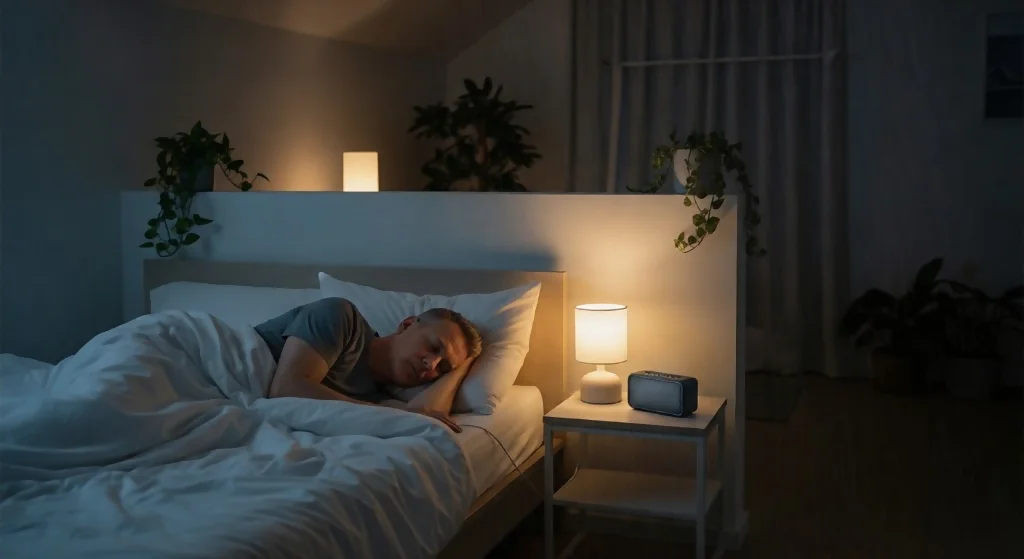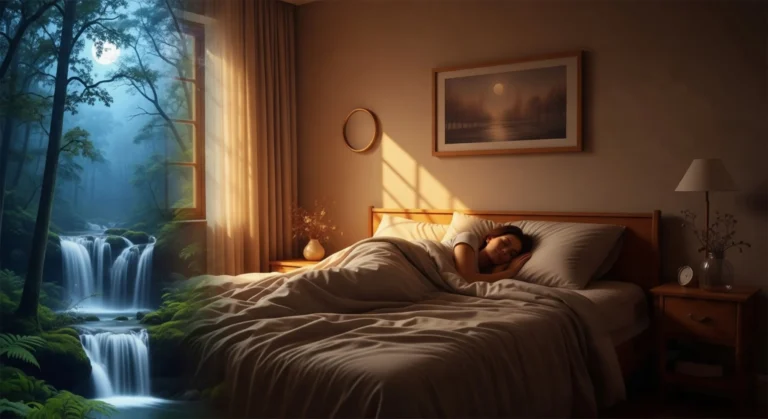5 Evidence-Based Reasons Natural Sounds for Sleep Are More Effective Than Music for Deep Rest

Introduction
Deep, restorative sleep is crucial to our health and overall well-being. With our frenetic world, there is no shortage of people dealing with stress, insomnia, or just not getting great sleep. Although music has been a widely accepted part of relaxation for the longest time, however, more and more research shows that natural sounds for sleep—like falling rain, the ocean, rustling leaves, a singing bird, etc.—can prove to be much more effective in inducing deep, restorative sleep.
In this piece, we will outline five evidence-based factors that explain how natural sounds for sleep can be beneficial for us than music. There are a number of ways that natural sounds for sleep can affect the brain, elicit relaxation, lower a person’s stress, and improve sleep quality. In addition, we will provide some useful tips to use with natural sounds for sleep and give an internal guide on standard natural sounds for sleep. If you are looking for a better night’s sleep or a healthier bedtime routine, this guide will help you understand why you may want to look to nature for a natural remedy.
1. Natural Sounds Are Scientifically Proven to Reduce Stress
In 2017, a study in Scientific Reports by Brighton and Sussex Medical School (United Kingdom) showed that natural sounds for sleep (like streams and birdsong) significantly reduced the body’s fight-or-flight reaction, leading to activation of the rest-and-digest mode in the nervous system (source: Scientific Reports).
These types of ambient sounds, naturally occurring nature, have been shown to calm the brain and body by lowering levels of cortisol (stress hormone), decreasing blood pressure, and helping to regulate breathing. Afterwards, sounds like music, especially if vocal or with tempo changes, could stimulate the brain as opposed to calming it.
Actionable Tip:
Try playing rain sounds or a wind/rustling leaves nature sound for a certain amount of time before sleep (30 mins). Use a reputable sound app or speaker with a timer, so it turns off once you fall asleep.

2. Natural Sounds Induce Deeper Brainwave States
Natural sounds induce deeper brainwave states like delta waves, which are associated with the deepest levels of sleep. Delta waves happen during non-REM sleep, which is vital to physical restoration, immune function, and memory processing.
Conversely, most music, even calming styles, often has rhythmic components that inhibit deep brainwave entrainment. This means it is more likely to stimulate the brain instead of calming it.
Example:
Think of the rhythmic waves of the ocean. Each wave comes and goes at a slow, steady tempo. The natural result is that your brain will entrain itself to the waves and relax deeper.
Actionable Tip:
Set your sleep environment up to play ocean waves or relaxing forest sounds all night. Don’t play sounds with musical instruments or voices.
3. Nature Sounds Are Distraction-Free
Natural sounds have three main advantages over music:
- Natural sounds include no lyrics, melodies, or even emotional baggage. They have neutral memories, which keep them away from triggering thoughts that could inhibit sleep.
- Since natural sounds are completely predictable, and there are no changes or emotions, the brain isn’t thinking about whether the music will change or what might happen when it does change. In addition, many people find themselves more alert while listening to calming music, without knowing it, because there may be some mental association or anticipation for a change in the song.
- The only emotion related to natural sounds is that of calm.
Example:
When I listen to a slow piano piece, apart from the relaxing qualities, I am likely to have some emotional memories come in. A naturally bubbling stream: zero memories. Calm.
Practical Tip:
Look for recordings that imitate natural environments, such as the sound of rain on leaves, distant thunder, or quiet forest sounds with birds. Avoid all tracks that say “relaxing music.”

4. Nature Taps Into Evolutionary Calm
Human beings evolved in natural environments. That is why natural soundscapes feel familiar and safemaya sit back and be comfortable. When you hear chirping birds or the rustling leaves, ASE around you, your body is subconsciously saying everything is alright, because throughout natural history, these sounds invoked feelings of being safe.US or LE.
Music is a modern invention – while music can soothe, it does not have the same inherent evolutionary effects on your panic zone as nature does. Nature’s sounds, come, are part of you – biologvidos, the music aspect comes later.
Scientific Insight
Dr Rachel Buxton from Carleton Uni suggests “Natural Soundscape. is a forgotten resource for health benefits. Listening and being exposed to them has meaningful, measurable health benefits (source).”
Practical Tip
Consider a white noise machine or sleep sound device that specializes in good natural recordings to use as a guide for quality and natural sleep sounds. We recommend this sleep sound device, which encourages pleasant and natural sleep sounds.
5. Why You Will Sleep Better With Natural Sounds Without Melodic Dependences
A limitation of sleep routines based on music is the requirement of dependency on a particular melody. Many individuals need a pre-determined song or playlist to relax before sleep. If they don’t have that song, their sleep quality suffers. Natural sounds have no particular artist or melody, so they are easy to interchange, more flexible across multiple devices, and it is all ambient sounds, so you won’t have a problem identifying them as a melody has no objectives.
Furthermore, music choices are subjective, meaning what is relaxing to one individual can be distracting to another individual. On the other hand, nature sounds are non-distracting and universally relaxing regardless of your tastes. Everyone can take advantage of the relaxation of nature’s gentle hum.
Actionable Tip:
Change your nightly audio selection to just a neutral,non-melodic natural sound that you can turn on every night. Wind swaying through the trees or a waterfall ambiance are both suitable options. Sometimes it is difficult to find things that are not rhythmical, melodical, or an actual song-in those cases, try to find any pleasant sounds.
Frequently Asked Questions (FAQs)
Q1: Are natural sounds better for sleep than white noise?
Yes. While white noise will mask the background noise, natural sounds actively calm the nervous system and help brainwaves align with natural rhythm and time, providing deeper relaxation.
Q2: Can natural sounds help with insomnia?
Yes. Natural soundscapes relieve stress and anxiety (the two leading causes of insomnia). Natural sounds will more quickly help you fall asleep and stay asleep.
Q3: Is there a best time to listen to nature sounds?
Yes. The best time is to listen to them at least 30–60 minutes before bedtime. You can also play natural sounds all night, to get the full benefit if you are a light sleeper.

Conclusion: Re-establishing Your Natural Connection to Sleep
Natural sounds for sleep are not just a popular alternative to music. These sounds are literal nature sounds; what we now scientifically are calling a tool of relaxation, built over thousands of years of evolution. Nature sounds for sleep act to reduce stress and encourage brainwaves to produce slow-wave sleep cycles. Nature sound eliminates the worst distractions so our bodies and minds can reach deep sleep and rejuvenate.
Although music can be fun for sleep, music can also be stimulating emotionally and sonically inconsistent. Natural sounds are a passive, historically based subcontinental sound that can be trusted because of biological rhythms. Nature sounds like ocean waves, rain, or even sounds from a forest, could be your new sleep experience that you need for better sleep tonight.
If you are interested in trying some quality natural sound technology to sleep better,
Check out the nature sound sleep aid device → Click here
To read about the Benefits of Relaxation Sounds, Rain. Alleviates the body and mind, read this guide






